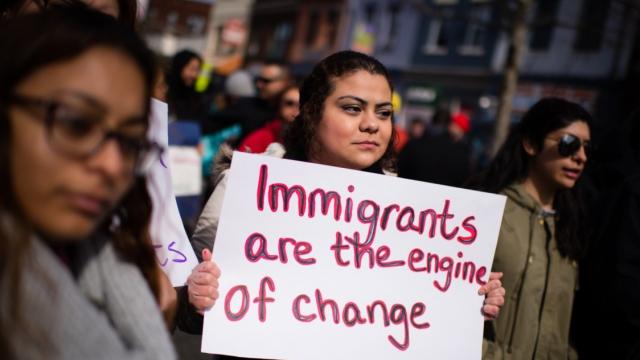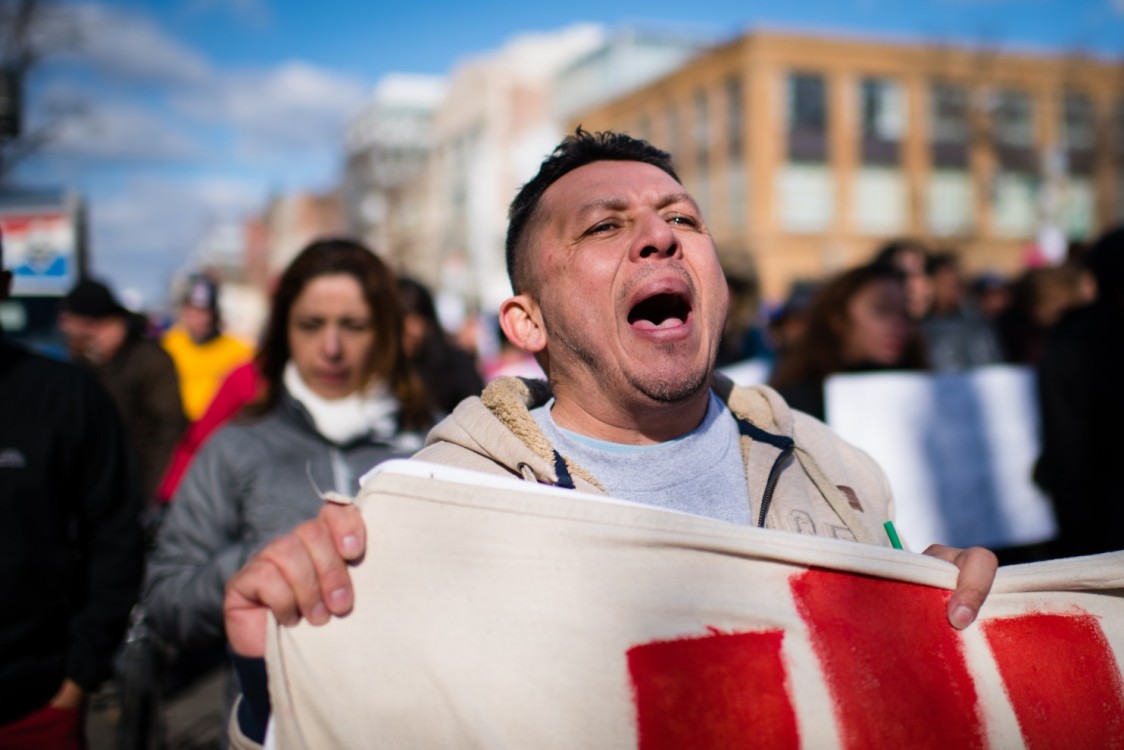
Upscale Washington restaurants canceled long-standing reservations. A ubiquitous fast-casual chain closed due to staffing shortages. And teachers posted pictures on social media of empty classrooms.
Immigrants across the country went on strike Thursday to highlight their economic importance to a new administration that has taken a hard-line stance on immigration policies.
The strike, spurred by a social-media campaign, called for immigrants not to go to work, to avoid spending money and not send their children to school. It was intended to span across all businesses, but it was the restaurant industry — where immigrants make up nearly 23 percent of the national workforce, according to data compiled by the Institute for Immigration Research at George Mason University — that seemed most affected.
Scores of restaurants in Washington, Minneapolis, New York, Phoenix and beyond shuttered for the day. A handful of day-care centers and D.C. charter schools, including Next Step and Latin American Montessori Bilingual, closed for the day.
Leandra Gonzalez, a teacher at Paul Public Charter School in the District, posted a picture of her empty English as a Second Language class Thursday. She said that students are fearful of what the new presidency means for them and that many of the students’ parents asked beforehand if they could participate in the strike.
“I made sure the students understood that it’s not about skipping school and having the day off,” Gonzalez said. “It’s about having the school understand what it would be like if they weren’t there, because they bring so much culture and interesting stories.”
In the Washington region, where about 48 percent of people working in the restaurant industry are foreign-born, dozens of restaurants closed. Food service in the U.S. Senate operated on reduced hours. Sweetgreen closed its 20 or so fast-casual salad outposts in the region. And celebrity chef José Andrés — a Spanish immigrant who is in a legal battle with President Trump after backing out of a contract to open a restaurant in the District’s Trump International Hotel — closed a number of his restaurants in the region.
Other restaurants opted to stay open with limited menu options because of staffing shortages. Many restaurants in the District still paid their employees if they decided to strike, while those that offer paid leave had employees take vacation days.
“It’s important,” said Jose Alexander, a barback at Lost Society steakhouse in the District who migrated from El Salvador in 2004. Lost Society closed Thursday, and Alexander said he still collected his pay. “It’s important so we can help our other family members arrive here.”
Some restaurants that stayed open advertised they would be donating some of their proceeds to immigrant advocacy organizations.
It was unclear how many people participated in the strike across the country, but Clarissa Martínez-de-Castro, deputy vice president at the National Council of La Raza — a national Latino advocacy organization — said the protest sent a strong message.
“In a time when the administration doesn’t seem to see anything positive about the immigrant community,” Martinez said, “having small-business owners, chefs and their workers challenge that notion and give voice to the very real ways immigrants contribute to society is very significant.”
Critics of the strike said people who are in the country illegally should not be protected. Employers and participants in the strike did not distinguish between who is in the country legally and those who are undocumented.
As part of the strike, the nonprofit organization Many Languages One Voice organized a rally and march that shut down busy D.C. streets as hundreds marched from Washington’s Mount Pleasant neighborhood — which has a large Hispanic population — to the White House. The marchers held signs and chanted in English and Spanish, vowing to remain united.
“They will not build walls in our communities,” a large sign read.
They also called on D.C. government to keep raids out of the city and to provide more resources to ensure that the District protects undocumented residents. D.C. Mayor Muriel E. Bowser (D) has vowed that Washington will remain a sanctuary city.
Organizers of the protests hailed the turnout as a success and hoped Trump recognized the economic impact of the boycott.
“We know that the president speaks about immigrants and people of color like they’re disposable,” said Ray Jose, youth justice coordinator at Many Languages One Voice. “Immigrants are the backbone of this country, and Donald Trump needs to learn that.”
Hector Sepulveda, a D.C. real estate agent who moved from Chile in the 1990s, canceled business appointments and attended the rally with his 11-year-old daughter. After living through political unrest and the 1973 coup in Chile, he called what is happening in the United States “deja vu.”
“This is critical,” Sepulveda said. “Democracy seems like something that is routine, but right now it seems more authoritarian than democracy.”
Busboys and Poets owner Andy Shallal, an Iraqi immigrant and progressive activist, closed all six of his restaurants in the D.C. region. He said that it would be a “huge financial hit” that but as an immigrant who employs immigrants, it was an important stance to take.
“I’m an immigrant, so I have a bigger responsibility,” Shallal said.
Originally published by Washington Post
3 WAYS TO SHOW YOUR SUPPORT
- Log in to post comments















